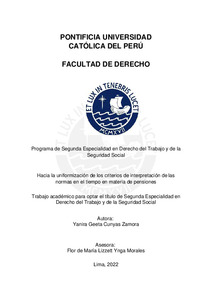Hacia la uniformización de los criterios de interpretación de las normas en el tiempo en materia de pensiones
Abstract
Este trabajo busca establecer si la regla de aplicación inmediata de normas en
el tiempo que contempla el artículo 103° de la Constitución Política del Perú,
resulta ser suficiente para resolver los problemas de sucesión de normas en
materia de pensiones que suscitó y viene suscitando las reformas
implementadas en los regímenes pensionarios a cargo del Estado. Para ello se
ha analizado la variedad de criterios jurisprudenciales que ha emitido el Tribunal
Constitucional, así como los que fueron asumidos por la Corte Suprema de
Justicia de la República. Encontrando que ante la urgencia de aplicar de forma
inmediata esas reformas se ha recurrido a la regla de retroactividad que nuestro
ordenamiento permite exclusivamente en materia penal y cuando ésta es
benigna, criterio equívoco que no contempló el tracto sucesivo de las
prestaciones que se otorgan con regularidad periódica mensual. Por otro lado,
también hemos encontrado que se ha recurrido a la regla de ultraactividad que
estuvo permitida en el texto primigenio de la Constitución antes de su reforma en
el año 2004, pero que hoy resulta necesaria por razones de justicia cuando se
encuentra en riesgo el contenido esencial del derecho a la pensión, postura que
encuentra aval en la propia naturaleza de este derecho y que la doctrina apoya. This paper seeks to establish whether the rule of immediate application of norms
in time contemplated in Article 103 of the Political Constitution of Peru is sufficient
to solve the problems of succession of norms in pension matters that the reforms
implemented in the pension regimes in charge of the State have raised and
continue to raise. For this purpose, the variety of jurisprudential criteria issued by
the Constitutional Court has been analyzed, as well as those assumed by the
Supreme Court of Justice of the Republic. We have found that in view of the
urgency to immediately apply these reforms, the rule of retroactivity that our legal
system allows exclusively in criminal matters and when it is benign has been
resorted to, an erroneous criterion that did not contemplate the successive tract
of the benefits that are granted on a regular monthly basis. On the other hand,
we have also found that the rule of ultraactivity has been used, which was allowed
in the original text of the Constitution before its reform in 2004, but which today
is necessary for reasons of justice when the essential content of the right to a
pension is at risk, a position that finds support in the very nature of this right and
which the doctrine supports.
Temas
Pensiones--Perú
Pensiones--Jurisprudencia--Perú
Retroactividad de las leyes
Derecho--Interpretación
Pensiones--Jurisprudencia--Perú
Retroactividad de las leyes
Derecho--Interpretación
Para optar el título de
Segunda Especialidad en Derecho del Trabajo y de la Seguridad Social
Collections
The following license files are associated with this item:






